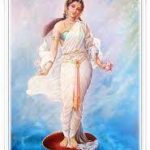Ganga is the holiest river of India. She is the Mother who washes away all sins and redeems one from the fetters of life. There are many folk songs about the Ganga, which testify just how much the river has been personified, deified, and made an integral part of Hindu spiritual life.
The origin of river Ganga is connected with the avatara (incarnation) of Vishnu as Vamana. When Vamana measured the three worlds, the nail of his left foot caused a hole in the upper side of heaven’s shell. From that hole, Ganga originated and fell into heaven. The point of her origin is called Vishnupadi. For a long time Ganga remained in the heavens. The spot where she originated on earth is called Dhruva-mandala, since the sage Dhruva did austerities (tapas) there for many years, resulting in the Ganga’s descent to earth.
The seven Rishis, who are the sages that begin each cosmic age, continually take their holy baths in the Ganga. The holiness of the Ganga is described in scripture (such as the Mahabharata and the Agni Purana). Even today, in spite of its polluted water, a dip in the Ganga is believed to remove all sins and bless one with heaven. The festival of Kumbhamela (celebrated every twelve years) is attended by many tens of thousands of people to offer their worship (pujas) to Mother Ganga.
The heavenly Ganga prepares to flow to earth through Siva’s matted locks.
The descent of the celestial Ganga to earth is described in the Bhagavata Purana. Many of the names are mythical, referring to heavenly regions and sacred geography. Ganga originated from Vishnupada (the foot of Vishnu) and flowed to devayana (literally, the way of the Gods). From devayana it descended to Candramandala. From Candramandala, Ganga divided into four tributaries called Sita, Cakshusa, Alakananda, and Bhadra, and then fell into Brahmaloka (Brahma’s land in heaven). It fell in various directions from Brahmaloka. Of the four tributaries, Sita fell on the head of Mount Meru and then flowed down to earth around Gandhamadana, went around Bhadrasvavarsa, and emptied into the eastern sea. Cakshusa fell on Mount Malyavan, went around the land of Ketumala, and emptied into the western sea. Alakananda fell on Mount Hemakuta, flowed around the land of Bharatavarsa (India), and emptied into the southern sea. Bhadra fell on Mount Sringavan, flowed around the land of Uttarkuru, and emptied into the northern sea.
One myth connected the river goddess Sarasvati with Ganga. Vishnu was talking to his three wives: Lakshmi, Sarasvati, and Ganga. During the conversation Ganga passed playful glances toward Vishnu behind the backs of Sarasvati and Lakshmi. Sarasvati saw this and became very annoyed. She got up and started beating Ganga. A fight raged between them. Meanwhile Lakshmi tried to intervene. Disliking her intervention Sarasvati cursed Lakshmi to be born on earth. Ganga cursed Sarasvati in return to be born as a river on earth. Sarasvati immediately cursed Ganga back to be born on earth as a river too. At this juncture Vishnu pacified all three wives but said that the curses had to have their effects and could not be taken back. Lakshmi was born as the Tulasi plant (Ocsimum Sanctum) in the asrama of the sage Dharmadvaja and grew up as his daughter. An asura (demon) named Sankhachuda who was a partial incarnation of Vishnu married her. In due course she became a river called Padmavati. As the Padmavati River, Lakshmi left her earthly form and returned to Vaikuntha (Vishnu’s heavenly abode). Ganga was led to earth by the prayers of King Bhagi- ratha and became a mighty river. She married a king called Santanu and gave birth to the Ashtavasus (eight Vasus who were attendants to Indra). After their birth she returned to Kailasa and became the spouse of Siva. Sarasvati became a river on earth, and, leaving her mortal form there, went to Brahmaloka and became the spouse of Brahma. This version was given in the Bhagavata Purana. Many other versions are told, including the one when the Ganga flows to earth from Siva’s matted hair.

